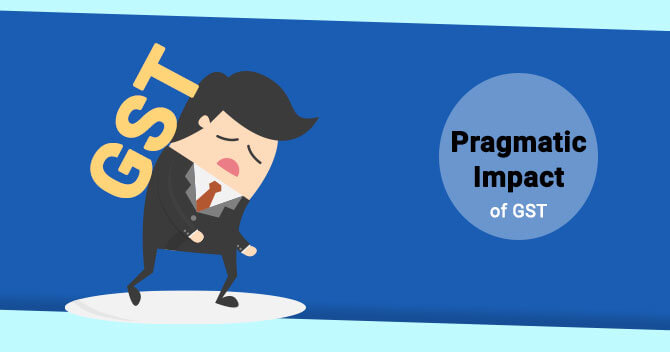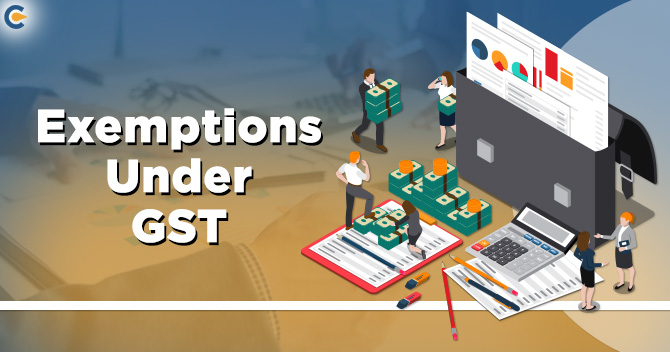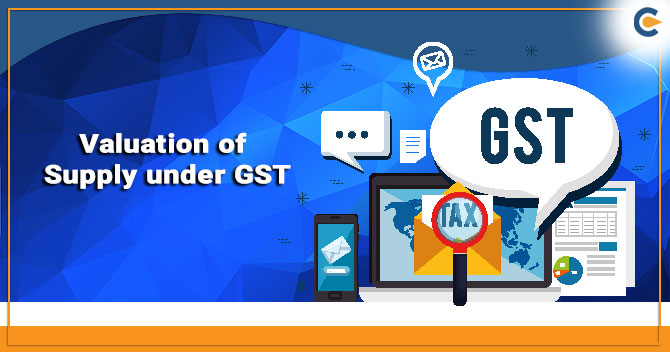Progressive growth is a sign of a developing Nation, a country like India has marked up its position in the world by growing its economy. This growth is observed more after the implementation of the new act for the taxation in 2017 named as GST (Goods and Services Tax) Act (Applicable from 1st July 2017). The components of GST are CGST (Central Goods and Services Tax), SGST (State Goods and Services Tax), and IGST (Integrated Goods and Services Tax). Here in this blog, we briefly discussed the impact of GST Rate, Online GST registration procedures and penalty.
Impact of the GST in the Indian economy
The GST (Goods and Services TAX) act in its implementation in which 20 states are independently showing more than a 14 % increase in their revenues. The number of assessees covered by the GST was around 65 Lakhs. The assessee base in the last two years has increased by 84 % that leads to higher revenue collections.
The complete scenario has been changed after GST as on today now, there is only one tax prevailing all over the nation and removed all 17 different laws. The pre-GST rate of taxation as a standard rate for the (VAT) value-added tax was 14.5 %, excise at 12.5 % and added with the central sales tax and the cascading effect of tax on tax, the total tax payable by the consumer was 31 %. The present GST has listed various commodities and items in the category of 18 %, 12 % and even 5 %.
Effect of GST on the Indian economy
The implementation of GST has radically affected the Indian economy in the ways given below:
Simplification of the tax structure:
GST has made the taxation system of the country easy as GST acts as a single tax umbrella and calculates taxes at the several stages of the supply chain. Because of GST both the manufacturers and customers get a comprehensible idea of the tax amount and its basis on which they are charged. In addition, hassles of management by the tax authority’s and officials can be avoided.
Fostering production:
According to the Indian retail industry, the total tax constituent 30% of the product cost but due to the GST impact the taxes have gone down. So, now the end consumer pays lesser taxes. The reduced tax burden has improved the production and development of the retail and other such industries.
SME support:
The Small and medium enterprises can now register under the Composition Scheme introduced by GST. Through this scheme, they pay taxes in accordance with their annual turnover. Therefore, the businesses with an annual turnover of Rs. 1.5 crores will only have to pay 1% GST. Furthermore, other enterprises with turnover of Rs. 50 lakh are obligated to pay 6% as GST.
Enhanced pan India operations:
A single taxation system has reduced the problem whereby earlier the manufacturers had to keep buffer stock to make up for the damages but now the companies can avoid taxation roadblocks like check posts and toll plazas. So, these overhead costs of warehousing and storing hindered their profit. Now this has resulted in the expansion of their pan India operations and they can easily transport their goods across India.
Increase in exports:
GST has reduced the cost of production in the local markets and also reduced the customs duty on exporting goods because of these factors it has improved the export rate in the country. The taxpayers have increased in number and the tax revenues have also increased extensively with the introduction of GST as it has removed the cascading effect of multiple taxes. Therefore, the tax burden has reduced for both the customers companies.
The procedure of the GST registration
Chapter VI of the Goods and Services Tax Act 2017 says about the registration.
Section 25 of the GST Act tells about the registration can be made within 30 days in any state or union territory for which the person is liable for the GST registration whereas the non-resident taxable person and a casual taxable person can apply for GST registration five days before the commencement of the business. Other important points under this section are
- A person is granted with the single GST registration either in any state or union territory.
- For the multiple businesses in different states, the same person has to opt for separate GST registration for every business subject to the conditions mentioned.
- A person requires more than one GST registration in one state of union territory can be considered as the distinct persons for the purpose of this act.
- A person gets the GST registration for the establishment but establishes in another state requires a separate GST registration for such establishment and considered as a distinct identity.
- A person other than liable for GST registration under Section 22 and Section 24 can also separately apply for the GST registration under this act.
- A person seeking for GST registration must have the PAN (Permanent Account Number) which is issued under Income Tax Act 1961.
- A person who is non-resident can submit other documents in support for the GST registration.
- If the person fails to obtain the GST registration, then the properly authorized officer proceed the registration as the manner prescribed by the act.
After the GST registration process, the (UNI) Unique Identify number shall be granted to the person/applicant and also a certificate of registration can be issued afterwards from such dates as prescribed by the act. If the applicant/person fails to communicate the authority in a prescribed period of time, then UNI (Unique Identify Number) can be cancelled by the authority.
Section 26 states that the (UNI) Unique Identify number or grant of registration under SGST (State Goods and Service Tax Act) or under (Union Territory Goods and Services Tax Act) would be considered as the grant of the GST registration under this GST act 2017.
Section 27 states that grant of certificate of registration to casual taxable or non-resident taxable person would be valid up to 90 days from date of issuance of the certificate of registration. The person has registration can submit the advance deposit of tax equals to the amount of the estimated tax. The amount will be credited to electronic cash ledger in favour of such a person.
Section 28 states that if any changes are required to be made by the person/ applicant in the registration after the issuance of the Unique Identity Number can inform the proper officer in authority for the rectifications in the GST registration. The officer then further can approve or reject the amendments as he deems fit, but this can be only done after the person/applicant is being heard.
Section 29 states that cancellation of the GST registration by the proper officer in case of death of the person where the business is discontinued either because of death of the owner or have obtained any another legal entity or business dispose of.
- It can also be done if there is a certain change in the constitution of the business.
- It can be done in case of taxable person no longer liable for the GST registration under this act.
- It can be done if the registered person contravened with the provisions of the act.
- It can be done if the registered person has not furnished tax returns from three consecutive periods.
- It can be done if the registered person has not commenced any business within six months after the date of the GST registration.
- It can be done if the GST registration is obtained by willful misstatement, by fraud or by suppression of the facts.
Section 30 states that the revocation of the cancellation of the GST registration can be made within 30 days from the date of cancellation orders have been passed. The proper officer can either revoke or reject the application after hearing the person who wants revocation.
Who all requires GST registration?
Section 22 and Section 24 of the GST Act 2017 tells about the people who fall under the category for the GST registration, and Section 23 of the GST act tells the people not fall under GST registration process are as follows:
Section 22
- The supplier is liable to be registered under the GST act if turnover exceeds Rs 20 Lakhs in a financial year.
- In the case of the special state category, the supplier registration under the GST act would be if turnover exceeds Rs 10 Lakhs in a financial year.
Section 24
- A person who has inter-state supplies.
- A person is making taxable supplies.
- A person who pays tax under reverse charge
- A person who pay taxes for supplies through electronic commerce operator
- A non-resident person who has made taxable supplies.
- A person is liable for deduction under section 51 of the GST Act.
- A person as an agent made taxable supplies on behalf of the other taxable persons.
- A person who is Input Service Distributor
- A person who is an Electronic commerce operator
- A person who supplies goods and services both
- A person supplies online information or have retrieval services or provide database access in India or outside India
- Any other person notified by the government after the recommendation of the council
Section 23 (People not liable for the GST registration)
- The person/supplier who has exempted from tax under this act or under the Integrated Goods and Services tax act (IGST) is not liable for registration.
- The agriculturist, who does not have to supply out of cultivation of the land.
Penalty Regarding GST Registration
Chapter XIV of the Goods and Services Tax Act 2017 says about the search, inspection, seizure and arrest after GST registration.
Section 67 states that if any person evaded tax liability, escape payment of the tax, or claimed the input tax[1] credit in excess or has kept in accounts in such a manner that reflects the evasion of tax under this act shall liable for the penalty.
Section 69 states that if any person has committed any offence mentioned in Section 132 of the act are liable for the arrest by the central tax officer in charge.
Conclusion
The GST registration is mandatory after the enforcement of the act of 2017. If the person wants to carry its business needs the compulsory registration. The procedures, importance and penalty are mentions above. The Corpbiz has the team of lawyers who deals in the procedure of the GST registration as well as also deals if the person has any problems or penalty imposed in case of the GST. The teams have trained experts and respectively are ready to help and solve the issue regarding GST registration process and queries.
Read our article:Impact of GST on Tourism Industry











